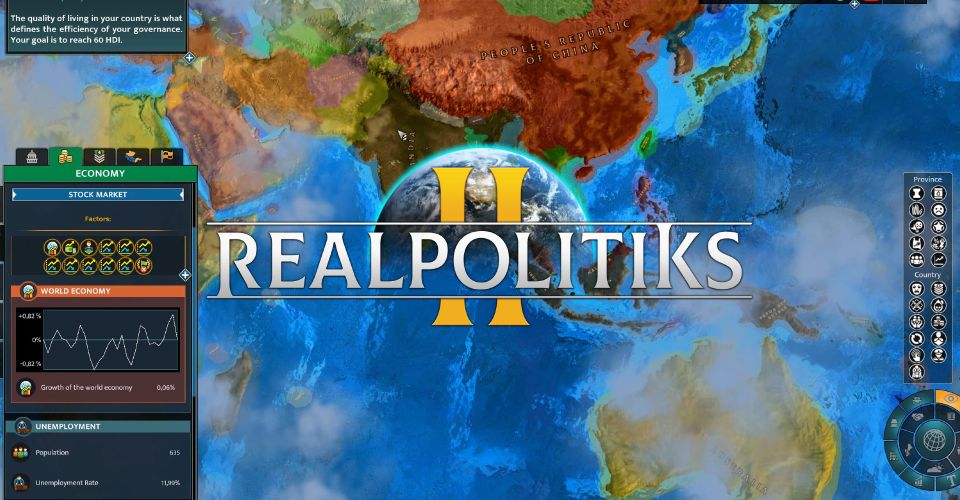Realpolitiks II Early Access Preview: Top-Notch Strategy Marred by Unbalanced Resources

This year has been a big one for political strategy and dynasty-building games, and RealpolitiksII could be another solid entry in the genre if it lives up to its Early Access promise. Developed by Jujubee, this sequel to Realpolitiks tasks players with leadership of any contemporary world power and allows them to carve a path to victory through globalization, culture, economic power, and more. Ultimately, they will need to make choices that lead their nation and people to world domination.
The main campaign of Realpolitiks II comes with deep, rich strategy gameplay, allowing players a good amount of control over their nation, projects, policies, and relations. Actions have proportionate consequences, and chance events can force the player as leader to make some difficult choices and compromise values for needs. Players can also choose to play mods or enter a new game mode meant to simulate life in a post-pandemic world. Unfortunately, bugs and pacing and resource issues detract from an otherwise well-conceived romp into global politics and policymaking.
The gameplay and strategy systems in Realpolitiks II are well done, though they don’t quite reach the same complexity as a game like Crusader Kings 3. Players can set the tax rate, lobby their Parliament or Congress to gain support, and ally with, annex, or declare war on other nations. Like in Crusader Kings 3, they can also focus on military power and espionage. In the Projects panel, they can select projects, technologies, and laws and policies to invest in and introduce to their nation. The Projects system is particularly fascinating, with only two project slots available, which forces players to prioritize and plan. The options are deep and extensive as well, giving players many avenues to create their utopia or dystopia.

Unlike the first installment, Realpolitiks II allows players to build within their provinces and off the coasts of their nation. These projects range from heavy industry, like Pit Mining or a Nuclear Power Plant, to humanitarian efforts like a U.N. building or a theater or university. Each kind of building provides new resources to a player’s nation, increases quality of life, and affects GDP and employment.
It is easy to get sucked into the gameplay and strategizing in Realpolitiks II, but the experience can become frustrating due to issues of repetition, pacing, and resource management. One instance that stands out is the system of creating a Bloc with other nations. Starting a Bloc and adding nations to it requires players to gain favor with those nations, a process that is almost always effective but not always available. They can also invest in these nations, which is more likely to fail. The chances of success never change depending on the player’s nation’s relationship to the nation, nor do they vary between nations. This breaks immersion and makes the act of gaining allies feel repetitive and less dynamic.
Though there is a fast-forward option in Realpolitiks II, it is not very fast, and projects or activities tend to take months to years in-game to complete. The slow passage of time and the limited number of projects that can be in-progress at a time make Realpolitiks II a frustrating game of hurry up and wait. Normally, chance events, like advisor scandals or diplomatic opportunities, will interrupt the flow of time and divert the player’s attention, making the game feel like it is moving again. However, these chance events don’t trigger frequently enough. Players might go a half hour without seeing one, only to then get three in a row. A smoother and more consistent pace throughout would prevent too many lulls and keep the game engaging.

Finally, resource management is an important aspect of leadership and a crucial part of the main campaign of Realpolitiks II. Players need money, a currency called Action Points, and natural resources like metals, fuels, and precious gems to complete projects and pay for upkeep on those projects. Like in games like Gears Tactics, Action Points are the most important and the most difficult to obtain, and anything the player does requires some amount of these. After around four or five years in-game, players are likely to find their nation stagnating, with no projects available because of insufficient Action Points. When a player gets close to earning enough Action Points for a project, a chance event tends to pop up, and the solution costs half or more of those saved Points. While earning more money is challenging but not impossible, with multiple means of increasing a country’s wealth, players receive far fewer incoming Action Points than they need. This lack of balance is likely to frustrate even the stingiest strategist.
Despite its flaws, Realpolitiks II is a deep and addictive strategy experience and a fascinating glimpse at national and global politics. If Jujubee can iron out some of the resource management issues and bugs and create a more consistent pace during Early Access, more fans will likely find themselves fully immersed in and satisfied with the experience.
Realpolitiks II is in Early Access and is available for PC. A Steam code was provided to Screen Rant for the purpose of this preview.
About The Author

















